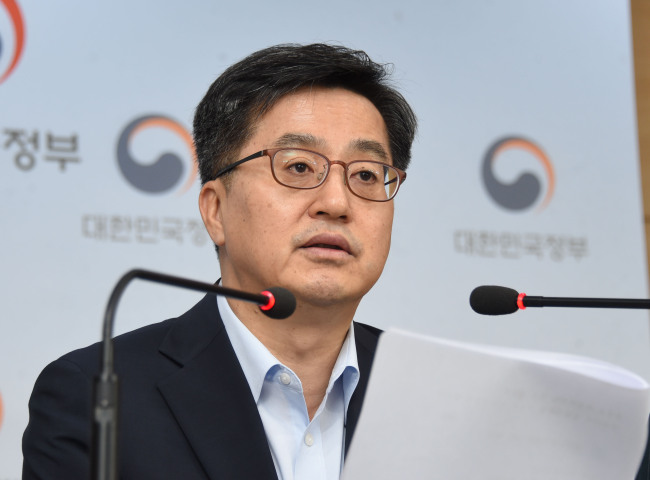The Moon Jae-in government said Friday that it will raise the real estate taxes for high-priced properties and multiple home owners, in a move to reduce the widening wealth gap, steady housing prices and promote fair taxation.
Should the renewed tax plan take effect, some 350,000 real estate owners are estimated to pay 700 billion won ($625 million) in additional tax, starting next year, unless they register themselves as lease business operators.
The Ministry of Strategy and Finance held a joint press briefing at Seoul Government Complex to announce its proposal on real estate taxation, days after receiving a related recommendation from a special presidential panel on fiscal reform.
The ministry is slated to finalize the proposal within the month and submit the tax system renewal plan to the National Assembly in September, hoping to effectuate the revised law as early as next year, according to officials.
 |
Deputy Prime Minister and Finance Minister Kim Dong-yeon on Friday speaks in a press briefing to announce the government‘s plan for a real estate tax rate hike. (Ministry of Strategy and Finance) |
“A low property tax rate not only contradicts the principle of fair taxation but also leads to overvaluation of specific regions and real estate items,” said Deputy Prime Minister and Finance Minister Kim Dong-yeon.
“The consequent polarization of wealth, damage of compensation system, inefficient allocation of resources may ultimately deliver negative impacts on the economy.”
According to data compiled by the Organization of Economic Cooperation and Development, Seoul’s property tax rate compared to its real estate asset total stood at 0.16 percent as of 2015, which was less than half of the OECD average of 0.33 percent.
The core measure of the proposed scheme was a 0.1-0.5 percentage point hike of the comprehensive real estate tax rate for properties priced at over 600 million won, raising the maximum rate to 2.5 percent from the current 2 percent. Those who own more than three properties in the price cluster will have to pay an additional 0.3 percentage point.
The tax burden for properties valued at 600 million won or below will remain unchanged at the current 0.5 percent.
The government’s recommendation for multiple home owners was to register themselves as lease business operators, in which case they may receive tax benefits according to the road map to activate the lease market in the upcoming years.
“Long-term lease house are excluded from the comprehensive real estate tax plan, so multiple house owners have a way of reducing their tax burden,” Kim said.
The ministry also said that it will seek to gradually raise the taxable rate for properties up to 90 percent by year 2020 from the current 80 percent, as part of its plan to reduce the price gap between tax base and actual market price. The taxable rate, referred to as a fair market value rate, is an index used to calculate the annual assessment value for real estate taxes.
The tax overhaul is expected to affect around 350,000 people and create an extra tax revenue effect of 740 billion won, an amount which will be used to lower transaction taxes for newly-weds, the houseless and the socially disadvantaged clusters, officials said.
While tightening the rules on the real estate market, the minister remained prudent on increasing the tax rate on financial incomes, claiming that such measure could eventually push funds into the real estate market.
Earlier, the presidential panel had suggested that the threshold for comprehensive financial income taxation be lowered to 10 million won from the current 20 million won as part of efforts to collect more tax from the affordable clusters.
By Bae Hyun-jung (
tellme@heraldcorp.com)








